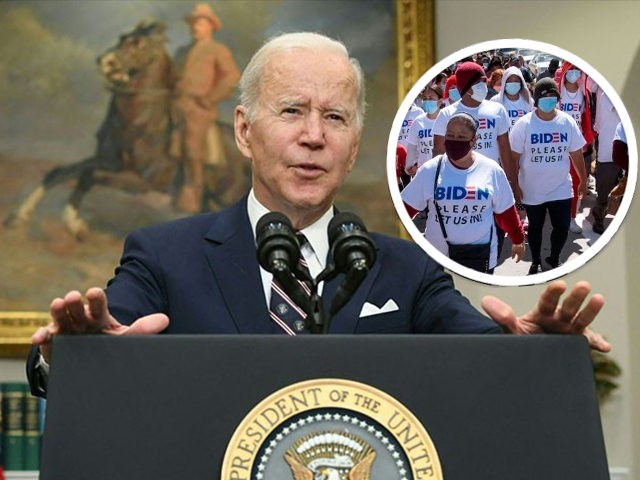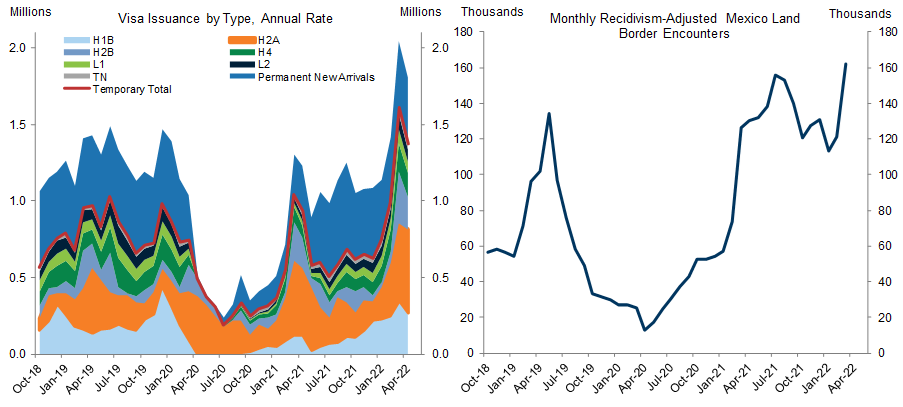President Joe Biden should cut roughly $100 billion from Americans’ wages in one year by importing 2.5 million extra foreign workers, says Wall Street’s leading investment firm, Goldman Sachs.
After President Donald Trump’s migration cuts, “the substantial gap between the number of workers and the number of jobs … has led to wage growth of 5 1/2% over the last year,” the firm complained on May 23.
“We have estimated that the [worker] gap would need to close by around 2 ½ million [extra migrants] to return wage growth to the 4-4½% range,” the report concluded.
The longed-for cut of 1.25 percent in Americans’ wages would take $137 billion from voters’ pocketbooks, each year, in perpetuity, according to data provided by another Wall Street firm, Moody’s Analytics.
Moreover, Goldman’s focus is on stock values. Those stock values are based on Wall Street’s predictions of future profits over the next 20 years. So Goldman’s one-year migration surge and one-year wage cut of $100 billion could boost stock values by about $2 trillion.
Insiders are already admitting that former Vice President Joe Biden’s plans to roll back most of President Donald Trump’s immigration reforms could spur a surge of illegal immigration at the United States-Mexico border. https://t.co/GWPsBKfaVg
— Breitbart News (@BreitbartNews) November 30, 2020
The transfer of wealth from employees to investors accelerated after 1990 when a bipartisan bill doubled the inflow of migrants and created new white-collar visa-worker programs.
Since 1990, the value of the Dow Jones Index has grown tenfold, while median wages and salaries have remained flat. During the same period, the NASDAQ grew 14-fold, as blue-collar and white-collar workers were forced to share their labor market with millions of foreign workers extracted from poor countries.
However, Goldman admitted that Congress is very unlikely to pass another “Comprehensive Immigration Reform” wealth-transfer law: “Recent polling from Morning Consult suggests that among President Biden’s major executive actions over his first year in office, reversing the Trump Administration’s immigration restrictions are some of the least popular.”
Many polls show the unpopularity of Goldman’s high-migration/low-wages agenda.
But Goldman’s authors suggested that Washington could market the labor-supply changes as popular inflation-fighting measures:
Still, there are reasons to believe some liberalization of immigration policies could be politically beneficial. Inflation ranks as a higher priority than immigration among voters of all parties, with the greatest difference among Democrats.
And those stock-boosting changes could be established by Biden’s deputies, not Congress, Goldman reports:
While major changes might be too politically controversial, smaller changes—particularly around temporary work visas and potentially regarding green card recapture—might be in the realm of political reality.
But the Goldman report has some good news for investors and migrants from their allies in Biden’s pro-migrant agencies:
More recently, immigration has rebounded. Green card issuance to new arrivals has roughly returned to its pre-pandemic level, and temporary work visas have gotten close to normal levels in just the last few months.
Goldman’s report is a self-serving fix for the benefit of investors and CEOs, but not for the nation’s economic strength, Kevin Lynn, founder of U.S. Tech Workers told Breitbart News. He continued:
What it should show everyone is that corporate America is concerned about the next quarter and earnings per share. They’re not concerned about productivity. They’re not concerned about innovation. The CEOs are concerned about how they’re compensated and they’re compensated on maximizing profit. That’s not necessarily good for the corporation, and it’s not necessarily good for America.
And Americans know this. This is why [investors] have to sneak [migration] in through rules and regulation changes because these things are so unpopular. The average American knows that unbridled immigration harms them.
But Goldman’s immigration-as-inflation-cure theme is already commonplace among pro-migration writers and reporters.
Biden “has in plain sight several measures that would reduce inflation significantly, and yet appears hesitant to take them,” the Indian-born columnist Fareed Zakaria wrote on May 19 in the Washington Post, adding:
This is the time to reverse more of Trump’s restrictions on immigration, many done by executive action and hundreds of which are still in effect, which have caused severe worker shortages in industries such as farming, construction and health care.
RollCall.com reported on May 9:
As concerns about rising levels of migration to the southwest border dominate discussions on Capitol Hill, lawmakers and advocates are pointing to high inflation rates and critical labor shortages in a push for the Senate to take action soon on more narrow immigration bills that could boost the U.S. economy.
“Anyone that will report on what’s in the best interest of the wage-earning classes simply isn’t going to be long for the job,” said Lynn. The journalists with jobs “are following the narrative. … [so] there’s a distinct lack of critical thinking,” he added.
However, Biden put the kybosh on that plan in his 2022 State of the Union, saying:
We have a choice. One way to fight inflation is to drive down wages and make Americans poorer. I have a better plan to fight inflation. Lower your costs, not your wages. Make more cars and semiconductors in America. More infrastructure and innovation in America. More goods moving faster and cheaper in America. More jobs where you can earn a good living in America. And, instead of relying on foreign supply chains – let’s make it in America.
Overall, Biden has zig-zagged between isolated calls for a popular, wage-raising, tight labor market — “Rising wages aren’t a bug; they’re a feature” — and reckless invitations to migrants. That Biden welcome allowed his deputies to begin reinflating the post-1990s cheap-labor bubble with at least 1 million extra workers via the southern border in 2021.
President Joe Biden's poll rating on immigration has slipped down to 35 percent, according to a survey by the Associated Press. https://t.co/3HrQZxenu8
— Breitbart News (@BreitbartNews) October 1, 2021
Each year roughly 4 million young Americans enter the labor market in search of wages needed for their own homes and families.
But the federal government also imports roughly one million legal immigrants, and roughly one million temporary workers, and does little to return at least 11 million illegal migrants to their home countries.
Extraction Migration
Since at least 1990, the D.C. establishment has extracted tens of millions of migrants and visa workers from poor countries to serve as legal or illegal workers, temporary workers, consumers, and renters for various U.S. investors and CEOs.
This economic strategy of Extraction Migration has no stopping point. It is brutal to ordinary Americans because it cuts their career opportunities, shrinks their salaries and wages, raises their housing costs, and has shoved at least ten million American men out of the labor force.
Extraction migration also distorts the economy, damages professionals‘ clout, and curbs Americans’ productivity, partly because it allows employers to use stoop labor instead of machines.
Migration also reduces voters’ political clout, undermines employees’ workplace rights, and widens the regional wealth gaps between the Democrats’ big coastal states and the Republicans’ heartland and southern states.
An economy built on extraction migration also alienates young people and radicalizes Americans’ democratic, compromise-promoting civic culture because it allows wealthy elites to ignore despairing Americans at the bottom of society.
The economic policy is hidden behind a variety of high-minded narratives. These include the claim that the U.S. is a “Nation of Immigrants,” that Americans have a duty to accept foreign refugees, or that the government needs a different population. But the progressives’ colonialism-like economic strategy reduces overseas investment, kills many migrants, exploits poor people, and splits foreign families as it extracts human-resources wealth from the poor home countries.
The economic policy is backed by progressives who wish to transform the U.S. from a society governed by European-origin civic culture into a progressive-directed empire of feuding identity groups. “We’re trying to become the first multiracial, multi-ethnic superpower in the world,” Rep. Rohit Khanna (D-CA) told the New York Times on March 21. “It will be an extraordinary achievement … we will ultimately triumph,” he boasted.
Not surprisingly, the wealth-shifting extraction migration policy is very unpopular, according to a wide variety of polls. The polls show deep and broad public opposition to labor migration and the inflow of foreign contract workers into jobs sought by young U.S. graduates.
The opposition is growing, anti-establishment, multiracial, cross-sex, non-racist, class-based, bipartisan, rational, persistent, and recognizes the solidarity that Americans owe to one another.


COMMENTS
Please let us know if you're having issues with commenting.